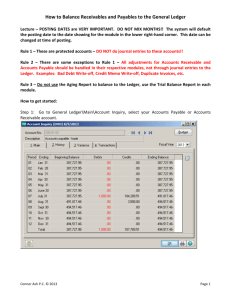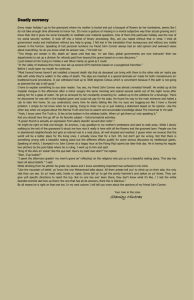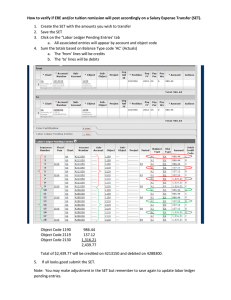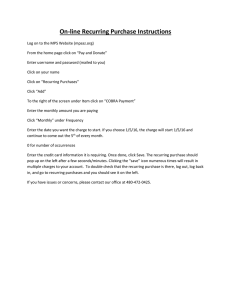Recurring vs Standard Journal Entries
advertisement
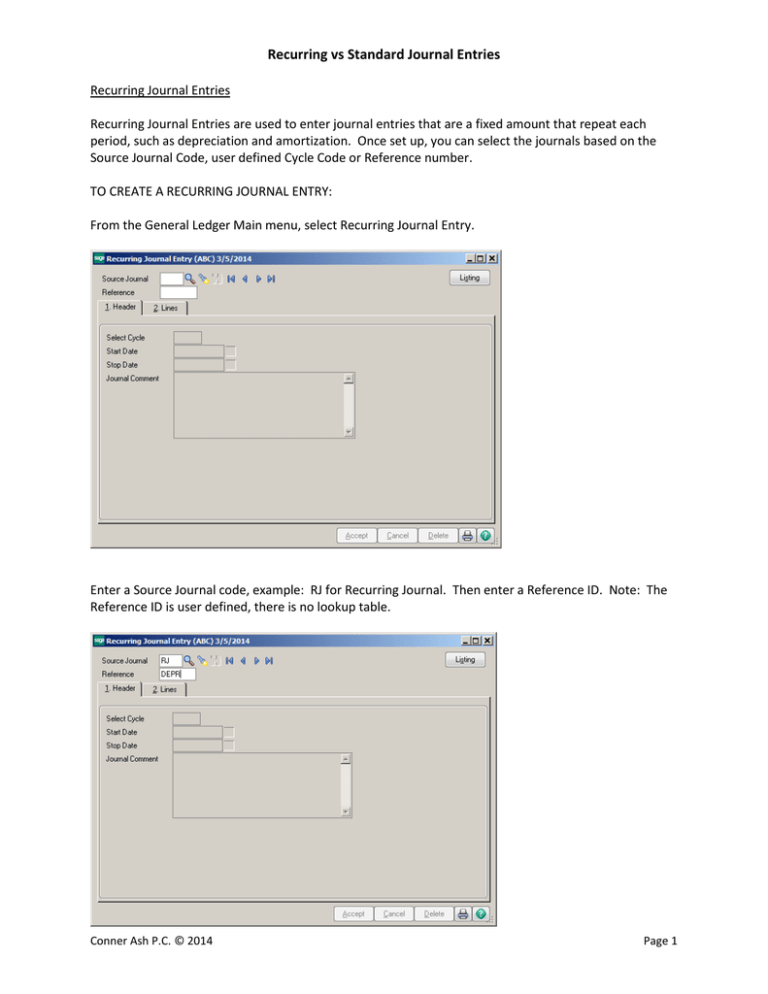
Recurring vs Standard Journal Entries Recurring Journal Entries Recurring Journal Entries are used to enter journal entries that are a fixed amount that repeat each period, such as depreciation and amortization. Once set up, you can select the journals based on the Source Journal Code, user defined Cycle Code or Reference number. TO CREATE A RECURRING JOURNAL ENTRY: From the General Ledger Main menu, select Recurring Journal Entry. Enter a Source Journal code, example: RJ for Recurring Journal. Then enter a Reference ID. Note: The Reference ID is user defined, there is no lookup table. Conner Ash P.C. © 2014 Page 1 In the Select Cycle field, enter the posting cycle for this journal entry. Enter a Start Date and Stop Date if you would like to restrict the use of the transaction based on this date range. Note: These fields are not required. Enter a journal Comment. Click on the Lines tab. Enter the General Ledger accounts and amounts that this entry should be posted to. Then click Accept. Conner Ash P.C. © 2014 Page 2 To print a List of your Recurring Journal Entries, click on the Listing button on the Recurring Journal Entry Screen. Conner Ash P.C. © 2014 Page 3 To run the Recurring Journal Entries, select Recurring Journal from General Ledger Main. Enter the Posting Date in the General Ledger Posting Date field. Enter the Source Journal, Cycle or Reference Number you want to select. Note: You can leave the default to ALL if you would like to select all journals. Click Proceed. Conner Ash P.C. © 2014 Page 4 The Recurring Journal will print. If you have no changes, click Yes to update the Recurring Journal. Conner Ash P.C. © 2014 Page 5 Standard Journal Entry Standard Journal Entries are used to record entries that contain the same general ledger account numbers, but will use different amounts each time they are entered. Example: Payroll Accrual. TO CREATE A STANDARD JOURNAL ENTRY: From the General Ledger Main menu, select General Journal Entry. Enter a Source Journal code, example: PR for Payroll Journal. Click on the # for the next Entry Number or assign an Entry Number. Enter Posting Date and a Journal Comment. Conner Ash P.C. © 2014 Page 6 Click on the Lines tab and enter the General Ledger accounts and amounts for this entry. Click on the Save Standard button. Conner Ash P.C. © 2014 Page 7 Enter a Standard Journal code. This will be used to identify the Standard Journal. You can also enter a Description. Then click Accept. You can now update your original entry. Conner Ash P.C. © 2014 Page 8 How to Use a Standard Journal Entry From the General Ledger Main menu, select General Journal Entry. Enter the Source Journal Code, then click on the # for the next Entry Number or assign an Entry Number. Click on the Copy From button. Conner Ash P.C. © 2014 Page 9 Click on the Standard Journal radio button. Then click Ok. Choose the Standard Journal that you would like to use. Click Select. Conner Ash P.C. © 2014 Page 10 The journal will be selected. On the Header tab, confirm or change the posting date and Journal Comment. On the lines tab, enter the dollar amounts for your journal. Once the amounts are entered, click Accept. Print the General Journal and Update. Conner Ash P.C. © 2014 Page 11 How to Use Separators When Printing Enter the customer numbers you would like to print using a comma as the separator. Note: Do NOT put a space after the comma. Conner Ash P.C. © 2014 Page 12 You can save the Report Setting by clicking the down arrow by the Save button. Choose Save As and then create a new Report Name. Click Ok. Click the magnifying glass at the Report Setting field to see the reports that you have saved in the system. Conner Ash P.C. © 2014 Page 13 Other Examples: Conner Ash P.C. © 2014 Page 14
